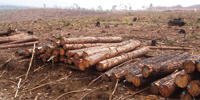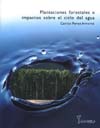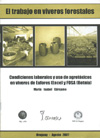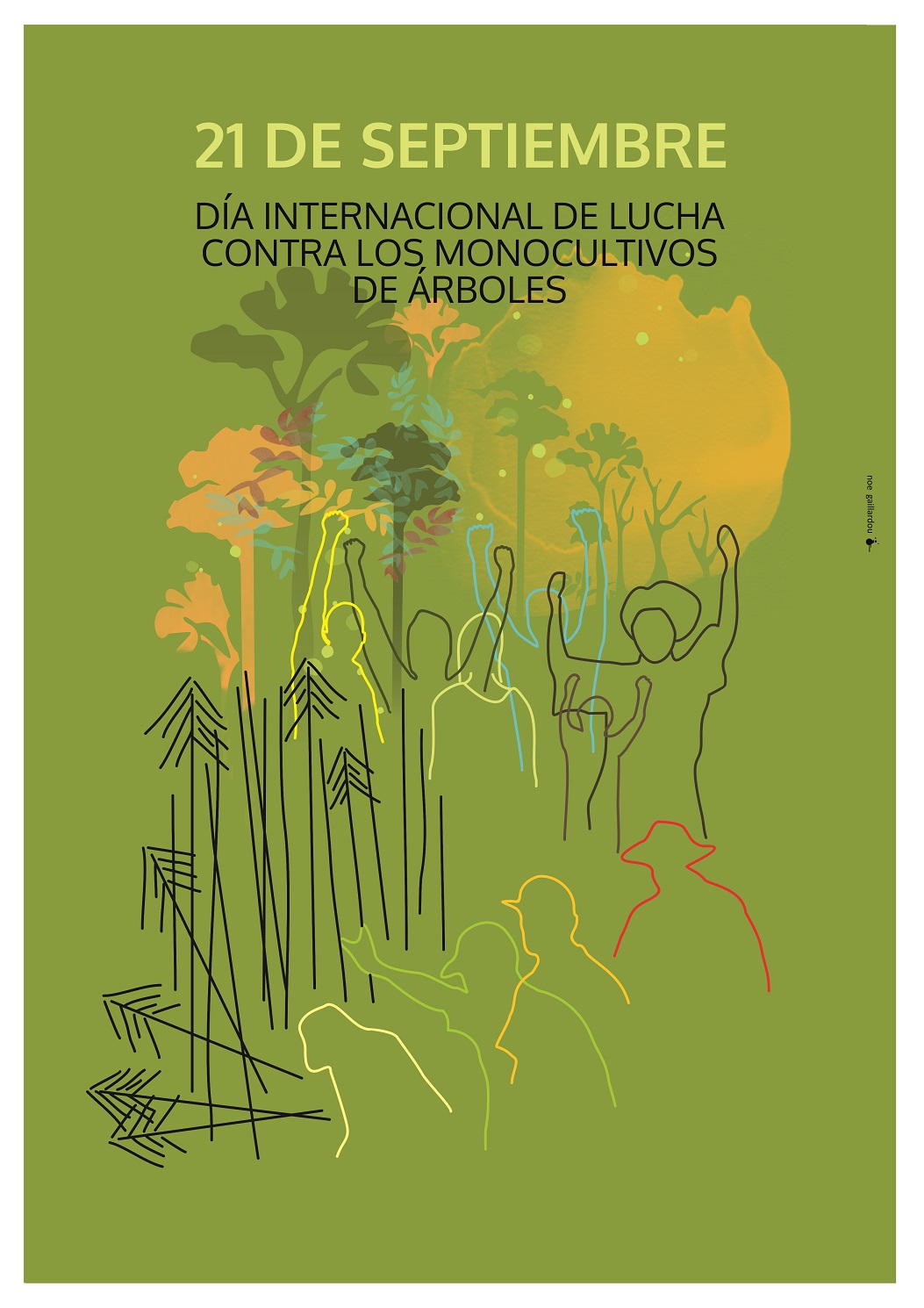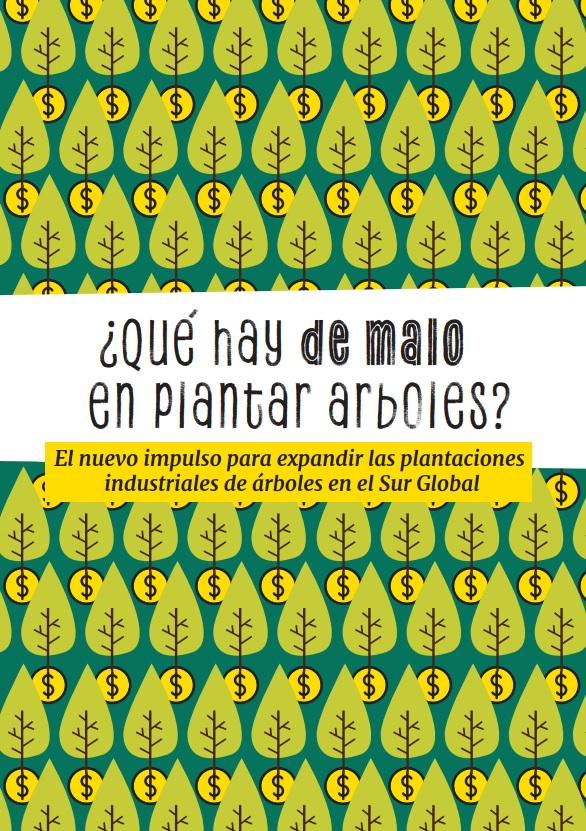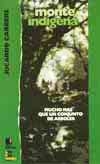In 1987 legislation was adopted that implied the promotion – by means of tax exemptions and subsidies – of large-scale monoculture alien tree plantations (mainly eucalyptus and pine) for export. It is thus that the country up till then based on agriculture and stock raising, started to convert part of its fertile grasslands into “green deserts” which presently cover over 700,000 hectares.
Concurrently, increasing opposition to monoculture eucalyptus and pine plantations took place. This opposition was partly the result of years of campaigns and concrete condemnations by local environmental, social and trade-union organizations who have been documenting the impacts of this “forestry” model. However, “credit” also goes to the forestry companies themselves, as their plantations have proven to have the negative impacts predicted by civil society organizations, while the companies’ social practices have left much to be desired.
In 2001 the Forest Stewardship Council – FSC entered the picture, certifying 5,000 hectares of plantations owned by Industrias Forestales Arazati (through the SmartWood certifier). For those familiar with the company and its long track record of environmental destruction (desiccation of wetlands) and anti union policy (including threats to shoot Woodworkers Union representatives off the premises), it was clear from the start that if this particular company could be certified then all the others would be as well. And this is in fact what has happened. One after another, the companies requesting certification have obtained it, but the negative impacts continue and worsen as monoculture tree plantations – certified or not – grow to cover increasingly larger areas of land in different points of the country.
In August 2005 seven companies in Uruguay had plantations certified by FSC, with a total certified area of 133,711 hectares. Out of these, five had plantations covering areas over 5,000 hectares, while two were small plantations (31 and 184 hectares respectively). Regarding the origin of the capital, two were foreign (the Finnish company COFOSA and the Spanish company EUFORES) and the remaining companies were national. Five were certified by SGS Qualifor, while the other two were certified by SmartWood (Rainforest Alliance).
Field work carried out by WRM at the end of 2005 and published in March 2006 (“Greenwash: Critical analysis of FSC certification of industrial tree monocultures in Uruguay”, http://www.wrm.org.uy/countries/Uruguay/text.pdf), describes the main certified companies in Uruguay (EUFORES, COFOSA, FYMNSA, COFUSA) and reaches the conclusion that none of four companies examined complies with the explicit mandate of FSC which sets out that “The Forest Stewardship Council promotes environmentally responsible, socially beneficial and economically viable management of the world’s forests”[sic].
In WRM Bulletin No. 104, we made reference in our article on Uruguay to the results of the study. The serious negative impacts on water, flora – particularly affecting grasslands, the country’s main ecosystem and basis for agriculture and animal husbandry production – fauna and landscape reveal that the certified plantations do not fulfil the conditions of “environmentally responsible” natural resource management.
Furthermore, the promotion of monoculture tree plantations has led to various trends. Company benefits from the forestry model are optimized under a latifundium system with an increase in the purchase of vast tracts of land – mainly by foreign companies. In turn this is an activity which excludes other productive activities because of the negative impacts it causes, thus contributing to rural migration. And employment promoted under this system is unstable, seasonal and outsourced. All these circumstances go to demolish the “socially beneficial” requisite
Regarding the requisite of “economically viable,” what can be observed is that, had it not been for the enormous direct and indirect subsidies – ranging from tax exemptions to highway building and maintenance – received from the State, that is to say, from the Uruguayan people, tree plantations would certainly not have been implemented in the country.
Finally and in the concrete case of Uruguay, certification of these plantations does not contribute to the promotion of sustainable forest management (forests are protected by law) and endorses the complete destruction of the country’s main ecosystem (the grasslands). .
Additionally, certification implies a weakening of local opposition because the companies receive a so-called “green label,” granted by a prestigious institution, in which social and environmental NGOs actively participate and that were actually those that created and promoted this certification scheme.
The fact is that these certifications erode the credibility of FSC, as its original terms of reference were aimed at the protection of forests through their appropriate management. The very fact that FSC considers plantations to be “forests” is detrimental to its credibility and added to certification of large monoculture tree plantations, in fact implies that it declares them to be “environmentally responsible, socially beneficial and economically viable” (as defined by its mandate).
Certified plantations in Uruguay: Can the FSC really guarantee peace of mind to consumers?
In March 2006, the WRM released the publication “Greenwash: Critical analysis of FSC certification of industrial tree monocultures in Uruguay” (see at http://www.wrm.org.uy/countries/Uruguay/book.html). The report addressed the four main certified plantation companies and included a very detailed critique of the certifiers’ reports, complemented with interviews with workers and people from local communities in the vicinity of the plantation areas. The report concluded that none of those plantations comply with FSC’s mandate because they are not managed in an “environmentally appropriate, socially beneficial or economically viable” way.
The two certification companies involved (SGS and Smartwood) reacted to the report by sending their response to FSC. Based on that “evidence”, the FSC disseminated a statement titled “FSC guarantees peace of mind to consumers” (see at http://www.wrm.org.uy/actors/FSC/Peace_mind.pdf). Heiko Liedeker, Director of FSC International, is quoted as saying that “Reading the certification body’s reports it is apparent that some information in the WRM report was based on misunderstandings or in some cases presented out of context” and ends promising that “Consumers can count on the FSC system as a guarantee for good forest management”.
We honestly believe that by acting in this way, the FSC is missing a good opportunity for change, particularly in the context of the current plantation certification review the organization is working on. The WRM report is in no way “based on misunderstandings” or presenting anything “out of context”; it is based on facts.
Unfortunately, much as we would like to, we cannot comment on SGS’s response, for the simple reason that the document they presented to FSC is not publicly available. We can however comment on Smartwood’s (available at http://www.wrm.org.uy/actors/FSC/fymnsa_clarifications.pdf), which states that “The WRM report findings related to stakeholder interaction do not agree with SW’s records or information on numerous elements.” In this respects, Smartwood provides the following information:
“The WRM report states that the head of a local workers union (Jose Bautista) indicated to SW his perspectives on FYMNSA certification and SW ignored them (“lo que dije a SmartWood sobre la certificación de FYMNSA no lo tuvieron en cuenta para nada” y que “luego que vino SmartWood a los pocos días había un gran cartel de la certificadora en las oficinas de la empresa”). [“everything that I told SmartWood with regard to the certification of FYMNSA was completely disregarded.” Meanwhile, after SmartWood came to assess FYMNSA’s operations, “within a few days there was a big SmartWood poster hanging in the company’s offices”]. We would clarify the following: SOIMANORPA, which Mr. Bautista heads up, was established in 2003. He was never interviewed during the initial assessment of FYMNSA simply because this organization did not exist at the moment. He was interviewed during subsequent assessment of another operation, Villa Luz, where he met with SW auditors Jacques Boutmy and Rolyn Medina. During that meeting he indicated that, from his perspective, WRM was not up to date on actual social or worker realities of operations in the field. He also indicated that FYMNSA was a leader in allowing the workers union to interact with FYMNSA workers, that his union maintains constant and very open communication with FYMNSA.”
That is Smartwood’s version, which apparently Mr Heiko Liedeker believes to be true. I spoke on Thursday, 20th of July with Mr Bautista and asked him if he agreed with the points raised above by Smartwood. His answer was: “It’s all false” (“es todo falso”). Mr Bautista is a very well organized person and keeps record of all he does. He was therefore able to track the meeting quoted above with Jacques Boutmy and Rolyn Medina, and discovered that it took place on 20 October 2004, well before WRM had even thought about carrying out this research!
I asked him more specifically on whether in his view “FYMNSA was a leader in allowing the workers union to interact with FYMNSA workers”. Once again he replied: “it’s false”. With reference to SW’s statement that “his union maintains constant and very open communication with FYMNSA”, Bautista explained that even though the company receives the union, that’s just a mere formality. And added: “three days ago I was interviewed in Rivera [the capital city of the province where FYMNSA is based] by TV Channel 6 and by four local radios and I said that the company was violating labour rights and that it should have never been certified. Maybe that’s the reason why Smartwood has reacted in this way”.
In its report to FSC, Smartwood adds that “FYMNSA has now hired an External Labor Auditor to ensure compliance with labor laws, regulations and procedures for all staff and contractors. This auditor sends monthly reports to FYMNSA on these issues, including corrective action requests (CARs).”
I also asked Mr. Bautista about this and he replied: “I don’t know anything about that”. One might think that the union leader with which apparently FYMNSA maintains such a good communication would be the first person informed about such good news. Unfortunately, this is not the case.
Even worse, Mr Bautista explained at length the present very conflictive situation resulting from the company’s violation of labour regulations and sent me in writing a summary of the main points of the conflict (see http://www.wrm.org.uy/actors/FSC/Letter_Batista.html). Contrary to what Smartwood’s response seems to imply, the document ends stating: “Dialogue with the Union still exists but the reverting of FYMNSA’s breaches of labour legislation and respect for trade union organization and workers has not been achieved.”
Even without taking into account all the other environmental and social impacts detailed in the WRM report, the above is sufficient to emphasize that in this case –where labour rights are being violated- the FSC cannot seriously pretend it can “guarantee peace of mind to consumers”.
By Ricardo Carrere, World Rainforest Movement, author of the report mentioned in this article. E-mail: rcarrere@wrm.org.uy
Source: WRM’s bulletin Nº 108, July 2006


